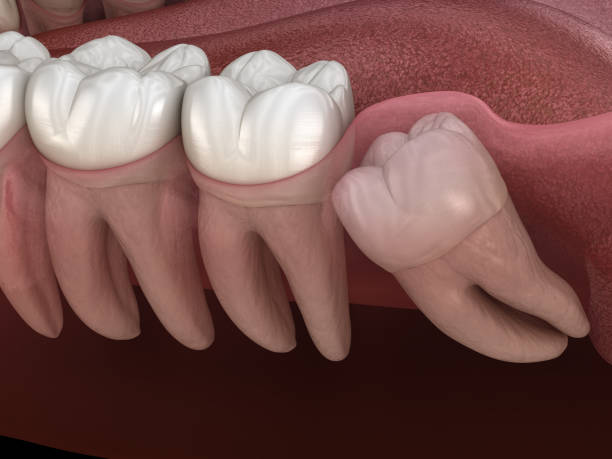We Are Open for Emergency Wisdom Tooth Extractions. Please Call for an Appointment: 212-757-9227
What is a Wisdom Tooth Extraction?
A wisdom tooth extraction is a dental procedure which is performed to remove the wisdom tooth, or third molar. The third molar is the backmost tooth in each of the four quadrants of the mouth. The third molars are the last teeth to emerge above the gumline, which they do typically beginning around the age of 16, but in some cases as late as the early twenties. The emergence of wisdom teeth will not always cause any issues which need correcting, but there can be pain, infection, or other complications for some people if extraction is not performed.
Why Should I Remove My Wisdom Teeth?

Wisdom teeth can take on different positions when they erupt, as no two individuals have the same teeth development. Although some wisdom teeth can grow properly, most are positioned horizontally or towards the second molars, which can impact the nearby nerves, jawbone, or other teeth. Some wisdom teeth become trapped in the bone, partially visible, and are called impacted. This can result in the entry of bacteria around the tooth, causing infections, pain, swelling, and other illnesses. Impacted wisdom teeth can also cause tumors and cysts, damaging the jawbone and surrounding teeth.
The visible wisdom teeth are more prone to decay and gum disease due to their location at the back of the mouth, making it challenging to clean them thoroughly. Hence, it is advisable to remove the wisdom teeth at an early stage to avoid potential problems. Early removal can reduce surgical risks and prevent negative impacts on other teeth, particularly for individuals with orthodontic measures such as braces in place. If you have any concerns, please contact Dr. Chung and his team at CCDDS at 212-757-9227 for assistance.
Why Are Wisdom Teeth Removed?
There are numerous reasons why one may opt for a wisdom tooth extraction procedure. This type of procedure is particularly advantageous for individuals experiencing issues due to the presence of these teeth. Impacted wisdom teeth can lead to several issues such as general pain, damage to adjacent teeth, periodontal disease, tooth decay, or in severe cases, infections of the face and neck.
Eliminating these symptoms by removing these teeth early can prevent future dental complications. Even if the wisdom teeth do not exhibit any symptoms, they may still harbor some form of disease. When a tooth fails to emerge correctly, it is challenging to clean, which may lead to the development of cavities or tooth decay. As such, it’s advisable to undergo the procedure as early as possible.
As you approach middle age, the risks associated with the surgery increase to some extent. When a wisdom tooth becomes impacted, there is an increased likelihood of developing small cysts and tumors. These are just some of the reasons why you should consider wisdom tooth extraction. The wisdom tooth extraction procedure is highly successful, particularly for those in their late teens and early 20s, with few potential long-term complications, making the downside of the procedure minimal.
What can you expect during a Wisdom Tooth Extraction?
Once the extraction begins, the gum tissue surrounding the tooth will be opened up, and any bone covering the tooth will be removed if necessary. The tooth may be divided into smaller pieces to simplify removal. After the surgery, stitches may be applied to the extraction site, which will dissolve in most cases. Typically, the recovery process only takes a few days.
How Do You Prepare For Wisdom Teeth Removal?
At your initial appointment, you can anticipate receiving a treatment plan. Additionally, X-rays will most likely be taken during your visit, so be sure to inform your dentist if you are pregnant or have any conditions that may be affected by the X-rays.
Dr. Chung and his team at CCDDS aim for your first visit to be an enjoyable experience. If you have any inquiries about what to anticipate or what to bring to your initial appointment, please contact 212-757-9227 and a team member will gladly assist you.
What is the followup and recovery like for a Wisdom Tooth Extraction?
The area will initially be tender following wisdom tooth removal, and there may be swelling which should begin to subside within the first few days. For two days after the procedure, it is recommended to avoid drinking through straws, smoking, or spitting. A follow up appointment may be recommended so that the doctor can make sure you are healing properly. If sutures were required, these will also be removed during your followup appointment.
How Long Will The Procedure Last?
The duration of a wisdom tooth extraction procedure depends on several factors. The time required for the procedure also depends on the location of the teeth and the number of teeth being removed. If only one wisdom tooth is being extracted, the procedure may take around 20-30 minutes, while the removal of all four wisdom teeth could take up to 30-45 minutes. If you choose to have IV sedation during the procedure, you should plan to be in the office for about 90 minutes.
What Is The Follow Up And Recovery Like For Wisdom Teeth Removal?
After the wisdom tooth extraction procedure, the recovery period can last anywhere from one to a few days. Initially, you may experience minor bleeding, swelling, and pain. Bleeding typically subsides after one day, while swelling and pain may last for 2-3 days. Bruising may also occur and last up to four days. During the first 2-3 days following the procedure, stick to drinking plenty of water and consuming only liquid foods such as soup, then switch to soft foods for the next 10 days. Stitches may be used in the treated area and will dissolve within a couple of weeks. Resume brushing your teeth and rinsing with warm salt water 24 hours after the procedure, but avoid using mouthwash for the first 7 days.
As impacted tooth removal is a serious surgical procedure, post-operative care is essential. Adhere closely to the provided instructions to avoid unnecessary pain and minimize the risk of infection and swelling.
Immediately after the surgery, leave the gauze pad over the surgical area for 45 minutes before removing and discarding it. After returning home, eat something cold like ice cream or yogurt, then take any prescribed pain medication and antibiotics to alleviate discomfort. Be sure to take these medications. Limit your activities on the day of surgery and resume normal activity once you feel comfortable.
Overexertion in the first 10 days after surgery can cause throbbing pain. Apply ice packs to the sides of your face where surgery was performed to reduce swelling.
After surgery, some bleeding is normal. If you experience slight bleeding in the saliva, do not worry. However, excessive bleeding can be controlled by placing a gauze pad over the affected area and biting firmly for thirty minutes. Do not talk during this period. To minimize further bleeding, remain calm, sit upright, and avoid exercise. If bleeding does not subside, contact your doctor for further instructions.
Swelling is also a common reaction to surgery, and it usually occurs around the mouth, cheeks, eyes, and sides of the face. The swelling will not become noticeable until the day following surgery and will reach its maximum 2-3 days post-surgery. To reduce swelling, apply ice packs to the affected area immediately after surgery. Use two baggies filled with ice or ice packs and leave them on while you are awake. If swelling or jaw stiffness persists for several days, apply moist heat to the affected area 36 hours after surgery.
Drink liquids initially. Do not use straws for the first 10 days. Drink from a glass instead, as the sucking motion can dislodge the blood clot and cause bleeding. You can eat anything soft by chewing away from the surgical sites. It is important to have a high-calorie, high-protein diet. Take nourishment regularly and drink at least 5-6 glasses of liquid daily to prevent dehydration. Try not to miss a meal, as regular food intake can speed up healing.
Do not rinse your mouth until the day after surgery. You can brush your teeth the day after surgery but rinse gently. Begin rinsing at least 1-2 times a day with warm water mixed with a teaspoon of salt, especially after eating.
